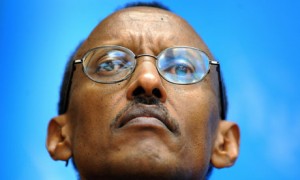Nicolas Sarkozy’s Rwanda accord rebuffed
AN attempt by French President Nicolas Sarkozy to end the row over France’s murky role in the 1994 Rwandan genocide has run into controversy as senior politicians in Paris snubbed the leader of the African nation.
Mr Sarkozy had invited President Paul Kagame to the French capital for what was billed as a reconciliation designed to bolster France’s waning position in Africa and to give Rwanda a gateway to Europe.
Instead, the visit yesterday served to highlight diplomatic strains arising from accusations of French involvement in the massacre of 800,000 Rwandans 17 years ago.
French Foreign Minister Alain Juppe, who occupied the same post at the time of the genocide, travelled to the Pacific Rim, having said that he had “no wish to shake” Kagame’s hand.
The chairman of the French Senate, Gerard Larcher, also refused to meet Mr Kagame, who is accused of staining French honour by claiming that France gave at least indirect support to the perpetrators of the genocide.
Jean-Claude Lafourcade, a retired general who commanded the French army operation in Rwanda, said the government in Kigali had, in effect, described his soldiers as “behaving like Nazis”.
The row centres on Rwandan claims that France armed the Hutu regime that carried out the mass murder of members of the Tutsi ethnic group.
Rwanda says French troops could have intervened to stop the killings, but did so only when Tutsis began to get the upper hand, and that the upshot of the French operation was to let the murderers get away.
The accusations were refuted in an official French report, although Mr Sarkozy conceded last year that France had shown a “kind of blindness” during the conflict.
Despite the row, the French presidency hailed Mr Kagame’s visit as a “new stage in the process of normalising relations between the two countries”.
After lunch at his Elysee Palace, Mr Sarkozy announced an increase in French aid to Rwanda from E23.7 million $31.2m) to E42.2m a year, along with private and public sector investment in banking and energy exploration.
Mr Sarkozy is seeking to rebuild bridges with a region where French influence has declined sharply over the past two decades.
He hoped that Mr Kagame would turn to Paris as he came under fire over human rights abuses in London and Washington. The Rwandan leader seemed keen to grab the outstretched hand, saying: “Really, the whole purpose is to find ways of overcoming our differences.”
September 16, 2011 No Comments
Visit of President Kagame of Rwanda (‘Assassin’) to France “was a great success”
Visit of President Kagame of Rwanda to France “was a great success”.
The President of Rwanda claims that his recent visit to France early this week has been a success. It obviously depends on which point of view he looks from! Have a look!
September 16, 2011 No Comments
Ingabire trial: Rwanda has adopted ‘Snail Strategy’
par Boniface Twagirimana,
Interim Vice President of FDU-Inkingi
INGABIRE TRIAL: THE GOVERNMENT HAS ADOPTED A SNAIL STRATEGY HOPING TO DIVERT NATIONAL AND INTERNATIONAL ATTENTION.
Kigali 13 September 2011 – Since the opening of this politically motivated trial, Paul Kagame’s government has adopted a snail strategy in order to divert national and international attention and hoping that the defense will end up in exhaustion. After the prosecutor failed the adjournment, he did not allow the key defendant Madame Victoire Ingabire, FDU-Inkingi chair, to pronounce any single word and instead he has been endlessly repeating the indictments.
The strategic low speed has nothing to do with the volume of the file . For example today on the 6th day of the trial, the Prosecutor has been reading again a dozen of documents supposedly from the inbox of the collaborating key witnesses Vital Uwumuremyi and Tharcisse Nditurende who pretend that those emails copies from an unknown sender are overwhelming proof of the funding of terrorist acts. In total, the allegations concern a total amount of 11,000 US dollars sent between 2008 and 2010 by different people to different recipients. Though the accuracy of those emails and locally completed western union forms is not established, the link between the names of different people involved and Madame Victoire Ingabire is not established beyond any doubt. The real substance of the much touted lengthy and meticulous investigation is not visible. It’s only mere statements volunteered by some defeated prisoners who happenened to belong to the FDLR and who are now serving the victor’s justice.
It’s clear that the government is buying time, expecting that the British barrister Iain Edwards who started the case will not stay indefinitely in Kigali and that he will need to return and take care of other national and international Court cases that need his attention. From the start, many european countries and international human rights organisations have been following the debates on a day-to-day basis. This has been a serious challenge to the prosecutor’s evidential content.
The same time, President Paul Kagame and the Foreign affairs Minister Louise Mushikiwabo continue to insert themselves in the case claiming that there is overwhelming evidence . For example on 11 september in Paris, echoing her president, the foreign minister told Radio France International: �Ingabire has committed extremly serious crimes. She is in court now, to defend her rights. If she is innocent, the court will tell. Let the future shows the truth�. Why they did not let her free of her movements and leave the judicial continue its course? This is just intimidation because they know that a judge who will engage the president of Rwanda or contradict him inside the country will put his career at risk. Should they respect or believe in their own judicial system, they would let it do its business with no interferences.
The trial is scheduled to continue every day from 08 to 13:00.
September 16, 2011 1 Comment

